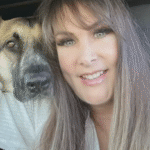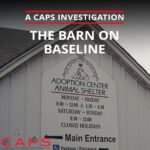Puppies St Pete
8240 Ulmerton Rd
Largo, FL 33771
(727) 216-6110
Date and time of CAPS investigation: 08/20/21; 1350
Approximate number of puppies observed at time of investigation: 50
There were about 15 wire crates in the store, each containing one to three puppies. Crates had several inches of shredded paper on their plastic floorings, as well as water bottles attached to their walls. Some crates had toys. Crates had no information on them about puppies’ breeders. Many puppies wore plastic collars that noted breed, individual identification number, gender, name, and a what appeared to be a number to indicate which number puppy they were from a litter. The collars had no breeder information.
A crate containing a German Shepherd puppy and Australian Shepherd puppy had two layers of paint on its flooring worn through in two spots, each several inches across. A crack in the plastic ran from the end of the flooring in one spot and at angle along the flooring for about four inches. This created sharp edges on the end of the flooring where it was broken.
I asked an employee (Hispanic male, about 35 years old, 5’6″, 175 lbs., with short black hair, very short moustache and beard, and black-rimmed glasses with no rim on the bottom of the frames, who identified himself as Jestin) about puppies’ breeders. He said, “The people we buy from have to be licensed from the USDA. Puppy mills are people who do not have licenses from the USDA. USDA goes to the physical houses of the breeders that we get every year for exams. If they fail, they get their license revoked.” I began to ask, “So if they get any violations…” and he said, “If they get any violations, they get their license revoked and they can’t apply for another one for three years.”
He then told me that some breeders have a dog or two in a house, and some are commercial facilities with a large number of dogs in a massive amount of dog enclosures. I told him that I believed he just described a puppy mill, and he said, “No, so the first thing I want to bring to your attention, that I said in the previous sentence, puppy mills are breeders that are not licensed and are not regulated.” He added, “One thing that I know that might assuage that question, none of the moms are bred more than three times in their life.” He said the moms are sold or adopted out after being bred three times.
The employee claimed, “All the puppies we get are from moms that are between two years and like five years, because they skip their first cycle. So, a female dog can get pregnant as early as nine months old. They have their first cycle at eight months, so, but they always skip their first cycle. So, the first pregnancy typically happens at about a year and a half to two years old. And then, like I said, they’ll breed them three times total. Sometimes they’ll skip a cycle. So, let’s just say you’ll have one mom give birth at a year and a half old to a litter, and a year later give birth to a second litter, and maybe the third year they take a year off, and when they’re four they’ll give birth to their fourth litter. And by their third litter, they cannot breed that mom anymore.” I asked, “Okay, that’s like a USDA thing?” He answered, “It’s like a USDA thing. So, by that point, they have this four-and-a-half-year-old dog that they can’t breed. So, what they often do is just sell him to whoever lives in the area, put him online, sell him to someone. If it’s like a designer breed that not a lot of people are interested in, they just give him to a shelter, so someone comes in and takes him from the shelter for like a hundred bucks. But yeah, they don’t breed them more than three times, and they have to be licensed so that they are not a puppy mill. A puppy mill is literally just a breeder that does not have any licenses.”
I then asked to see breeder info and USDA inspection reports on a Boston Terrier puppy. He said he had no inspection reports but showed me a pedigree that listed the breeder as JD Kennels, in Rhine, GA. As he showed me the puppy’s paperwork, he said, “Yeah, they get exams every week. So, if they fail due to health concerns or facility issues, or something like that, then they don’t get a license. And if they don’t have a license, we can’t buy from them.” I said, “Got it, okay. Any USDA violation, they remove their license for three years?” He responded, “Yep. And then they can, they get the opportunity to fix it and they can reapply for a license the next year.”
The employee then claimed there’s a point scoring list for violations that USDA uses to see if breeders pass. He said that if a breeder fails, they have a year to bring their score up to the correct level.
Evidence of false statements and misrepresentations of breeders by store
The employee’s claim that the USDA has a point scoring list for breeders is false. No such method of scoring exists for the USDA. The employee’s claim that the USDA will revoke a breeder’s license for a single violation is false. Thousands of examples exist of breeders who have/had numerous violations but USDA does not or did not (usually they retired or sold out) revoke their licenses. Some of these facilities are ones investigated by CAPS. Dennis Van Wyk in New Sharon, IA continues to have a USDA license despite numerous CAPS investigations showing deplorable violations. The “Dateline” hour-long exposé in 2000 featured our footage of Van Wyk’s facility. USDA only terminated the broker’s license of the notorious Kathy Bauck in New York Mills, MN after she was convicted of animal cruelty based on evidence from my employment-based investigation. She continued to sell puppies to New York pet shops without a license. USDA finally permanently revoked Bauck’s license, using evidence gathered by CAPS from research and from investigating the New York pet shops. Van Wyk and Bauck investigations are on the CAPS website, https://caps-web.org/.
In fact, USDA has made it very easy for licenses not to have violations. In response to regulatory ordinances, USDA started using teachable moments, self-inspections and a trial announced inspection program. Their recent guidelines also instructed inspectors not to cite ear, eye and dental diseases as veterinary care violations (this requirement was recently changed back). It is for these reasons that USDA Animal Welfare Act violations have significantly decreased.
The employee’s claim that breeders will not breed dogs more than three times as a “USDA thing” is false. No such USDA policy exists. CAPS has investigated more than 1,000 puppy and kitten mills, most of them USDA-licensed. In my 18 years with CAPS, I have been to more than 800 of these facilities. To maximize profits, commercial breeders breed female dogs on every heat, which is usually two times a year (some dogs skip a cycle). Mother dogs are usually bred on their first heat. Breeders typically kill mother dogs who are no longer fertile or producing small litters. Some puppy mills do give unwanted breeding stock to rescue organizations. CAPS has rescued some of these dogs during investigations.
The statement that puppy mills are breeders who are not licensed or regulated is not true. USDA-licensed facilities are puppy mills – commercial breeding establishments that mass produce dogs for resale. In addition, the USDA does not conduct “exams” of breeding facilities. They do inspections.
The employee’s claim that breeders have their puppies examined weekly is not true. Most breeders administer shots and deworming medication themselves. The only time a puppy usually gets examined, albeit briefly, is by a federally accredited veterinarian for a Certificate of Veterinary Inspection (CVI – interstate health certificate). Adult dogs suffer from myriad health conditions and are lucky to get cursory exams from veterinarians once a year (see summary of JD Kennel’s violations below).
Breeder information obtained during store investigation
JD Kennels (Judy Hulett), Rhine, GA, 57-A-0206, 362 adults and 198 puppies at 11/12/19 USDA inspection, 365 adults and 138 puppies at 3/5/19 inspection
USDA has not inspected Hulett since 11/12/19. During her 3/5/19 inspection, the inspector found the following violations: excessively thin Great Dane; brown exudate on teeth, bright red gums, possible fractured tooth, thick build-up on teeth; discharge covering both eyes with crusts on lid, an enlarged eye, which was dry and covered in stringy tissue, fur loss around both eyes; ear lesions; excessive feces, lack of bedding; and a large number of cockroaches. Hulett told the USDA inspector that none of her dogs had ever had their teeth cleaned.(see attached USDA inspection report).
Hulett’s first USDA license. 57-A-0130 was cancelled on 9/18/11. She did not apply for another license until early 2014. Her second pre-license inspection was on 2/20/14. Second pre-license inspections don’t take place unless the applicant had violations at the first inspection (no longer available online). The report noted that she had 306 adult dogs and 92 puppies, a large number for someone who would be just starting out. In fact, Hulett was selling online, which didn’t require a USDA license at that time, and to Puppy Town in Sarasota and Tampa, which did require a federal license. Her 6/12/14 inspection, the first one subsequent to her second pre-license inspection, cited violations for infected eyes and swollen front leg.
https://caps-web.org/snn6-a-puppy-town-protest/
SNN6: A Puppy Town Protest, 4/22/12
Breeder information obtained from January and February 2020 Certificates of Veterinary Inspection to Puppies Tampa.
This store stopped selling puppies in April 2021 due to the Hillsborough ordinance, but the location is open, with website stating that they can provide “recommendations and guidance to help you find your perfect new puppy.” A link on website takes you to https://yourpuppyfl.com, which is owned by Michael Lamprea, the owner of Puppies St. Pete and Puppies Tampa. Your Puppy, located next door to Puppies St. Pete, sells puppies on Facetime and delivers them same day or next day to certain areas of Florida. If customers pay for puppies before delivery and chose them on the basis of a video call, then this is considered an internet sale. Your Puppy does not have a USDA license, which is required for internet sales.
Preferred Canine LLC, PO Box 336, Sugarcreek, OH, 31-B-0197; physical address: 29952 CR 10, Fresno, OH (residence of Abe Miller, which is listed as an agricultural property under county tax records)
The owner of Preferred Canine is Abe Miller in Fresno, Ohio. Miller has a long history of selling sick puppies, violating the Animal Welfare Act, and being the subject of lawsuits. https://tinyurl.com/y5c26kqz
Every time, Miller is in trouble, he changes the name of his facility. When Sarasota County held a hearing for the ordinance banning the retail sale of dogs and cats in January 2016, he testified against the ordinance, using the kennel name of Quail Creek. Certificates of Veterinary Inspections over the last few years showed him using the names, Comfort Canines and Holmes for Canines. Miller hired a bus to transport at least 30 of his Amish breeders to testify against the ordinance, which passed in January 2016.
The dogs he brokered included those with the campylobacter virus that made dogs and people ill in the outbreak at numerous Petland stores.
https://www.cdc.gov/campylobacter/outbreaks/puppies-12-19/index.html
Golden Seal Puppies, LLC, PO Box 467, Sugarcreek, OH, 31-B-0193; physical address: 29939 CR 10, Fresno. OH (listed as a commercial property under county records); this property appears to be next door to Preferred Canine. Amishdogbreeders.com lists a John Yoder as the person associated with this address. We suspect that Yoder is a manager for Abe Miller.
Both businesses had filing dates of 2/4/19 by the same registered agent with the Ohio Secretary of State. Both had a pre-license inspection on 2/12/19 and subsequent inspections on 2/10/19 and 1/8/20. We don’t believe this is a coincidence.
Under USDA regulations, an individual or one business (LLC, corporation, partnership) cannot hold two USDA licenses. However, two different LLCs can hold two licenses, which is a convenient loophole.
Breeder formally used by Puppies St. Pete and Puppies Tampa
Georgia Puppies (Craig Gray), Nashville, GA
In March 2019, Georgia authorities rescued hundreds of dogs, most of them puppies, who were living in horrendous conditions at Craig’s Gray’s puppy mill in Nashville, GA. The Georgia Department of Agriculture had reported Gray to the Berrien County Sheriff’s Office after an inspection. Gray, who had more than 700 dogs, was charged with 16 counts of aggravated animal cruelty. He did not have a USDA license yet sold to Puppy Town in Sarasota and Tampa (renamed Puppies Tampa), which were owned by Michael Lamprea, the owner of Puppies St. Pete.
Craig was arrested in March 2020 in Florida and brought back to Berrien County, GA for failing to appear in court for violating the one of the conditions of his bond – that he not own or keep any animals. Gray was suspected of violating this requirement by having dogs.
CAPS tried for years to obtain CVIs for Lamprea’s stores. The Florida Department of Agriculture also requires that dogs brought into the state be examined by a Florida veterinarian for an in-state certificate, yet there weren’t any. We knew that Lamprea was bringing back puppies from Craig and Hulett in Georgia. We reported Puppies Tampa and Puppies St. Pete to the state, which finally took action in May 2017, shortly before Hillsborough County passed a pet shop ordinance that grandfathered in the four existing pet shop shops (grandfather clause removed in March 2020). There are no CVIs to Puppies St. Pete for June through September 2021.
https://www.baynews9.com/fl/tampa/news/2017/5/11/tampa_pet_store_owne
Tampa pet store owner, employee arrested for illegal puppy sales
Lack of USDA violations
The fact that few breeders and brokers have USDA violations does not mean that none exist. During our undercover investigation of USDA-licensed facilities, we document violations. USDA has made it very easy for licenses not to have violations. In response to regulatory ordinances, USDA started using teachable moments, self-inspections and a trial announced inspection program. Their recent guidelines also instructed inspectors not to cite ear, eye and dental diseases as veterinary care violations (this requirement was recently changed back). It is for these reasons that USDA Animal Welfare Act violations have significantly decreased.




